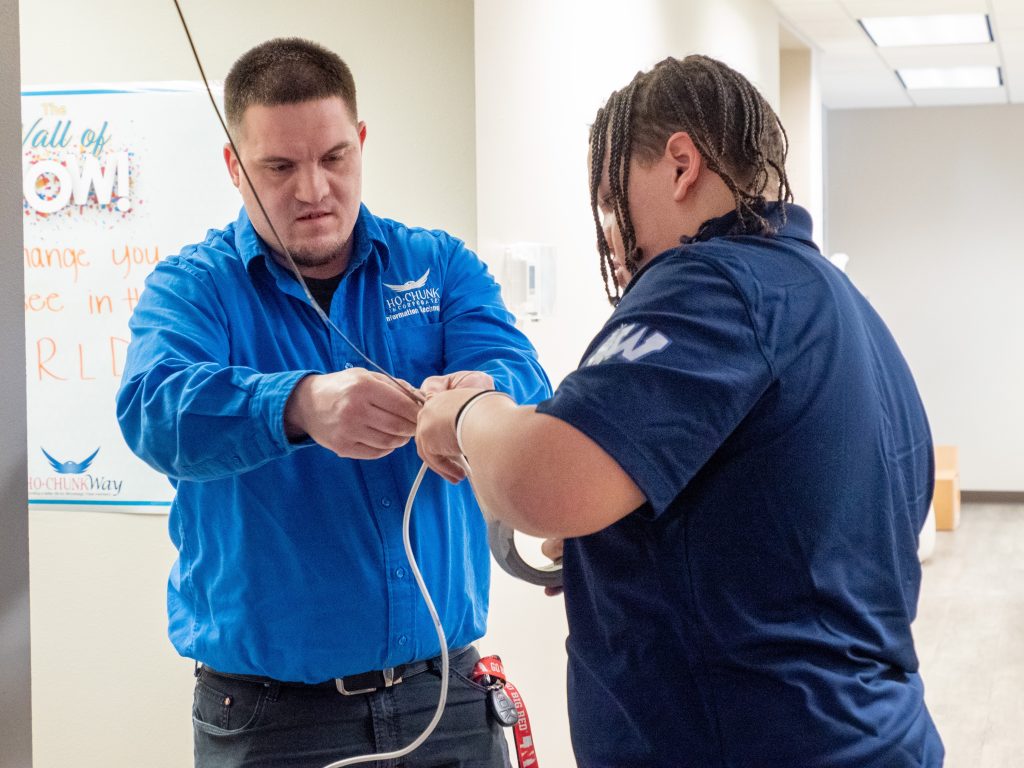Podcast: Play in new window | Download | Embed
Workforce watchers say the country could face shortages in many skilled trades in coming years.
Nebraska’s Winnebago Tribe is taking a proactive approach to the issue through a program for high school juniors and seniors.
The program includes Ho-Chunk, Inc. and local businesses, as Deborah Van Fleet explains.
Willy Bass, manager of community impact and engagement for Ho-Chunk, Inc., said tribal leaders realized they needed programs for their youth who might not pursue higher education.
“This program was intended to get students interested, and a foot in the door, in the fields of construction, IT, nursing, education, etc. Any of those sort of technical-related careers.”
Bass explained the students earn credits for spending two hours at their worksite four days a week.
On Fridays, they learn “soft skills” such as resume building, interviewing, and the importance of a good attitude and good attendance.
In the latest Harris Poll, more than 80% of employers reported many of their youngest workers lack these important soft skills.
Bass pointed out one of the tribe’s priorities is ensuring its members have job opportunities.
He noted some apprenticeship graduates choose to start working right after high school, while others pursue further training in their apprenticeship field.
“We want our kids to go off, get educated and come back and contribute to the tribe and make it a better place, and for them to be successful. If they want to contribute those skills on a broader scale in other communities, they have that support system.”
Kamau Turner, superintendent of Winnebago Public Schools, said they plan to build upon the program in the future.
He hopes students interested in a skilled trade will eventually be able to graduate from high school fully certified, which would be a boon for the Winnebago community.
“I have to call a plumber from Sioux City; I have to call an electrician from Sioux City. Our community is growing, our school is growing, and there’ll be more of those people needed. Jobs will have to grow as the community grows.”
Winnebago’s population has increased 30% in the past eight years.

Valerie Nurr’araaluk Davidson, then-president of the Alaska Native Tribal Health Consortium, speaks at a press conference on June 14, 2021. (Photo: Jeff Chen / Alaska Public Media)
Valerie Davidson is recognized as a trailblazer in Native healthcare and was head of one of the largest tribal heath organizations in the nation.
But Davidson is no longer president and CEO of the Alaska Native Tribal Health Consortium (ANTHC).
In a statement on its website last week, the tribal consortium announced she had left the organization.
As Rhonda McBride from our flagship station KNBA reports, it gave no explanation why, other than to say she was “transitioning” out of the job.
A number of Alaska Native leaders who were reached for comment call the news about Valerie Davidson’s departure shocking, in that it was so sudden and abrupt.
But the news traveled fast to her old boss, former Gov. Bill Walker (I-AK), who is on a trip to London.
Gov. Walker says he’s both surprised and dismayed.
“It’s just such an awkward situation, I’ll put it that way, because she’s so gifted.”
Gov. Walker initially tapped Davidson to be his Health and Social Services Commissioner, where she successfully oversaw the state’s push to expand Medicaid, which Gov. Walker says has saved the state millions.
“I witnessed her literally move mountains on healthcare issues that benefited Alaska. There’s nothing she wouldn’t do, if it helped provide healthcare in Alaska.”
The statement from the tribal consortium, while it gives no explanation for replacing Davidson, heaps praise upon her for guiding the organization out of what it describes as a “leadership crisis”.
In the statement, the consortium’s Board of Directors credited Davidson with numerous successes during her watch — that included major investments and meaningful improvements – which it says supported the “remarkable transformation of the organization.”
“Val has been a pioneer, speaking her truth, which I think is very difficult to do in those high-level positions.”
Gary Ferguson is an Alaska Native naturopathic doctor, who currently works as a researcher at Washington State.
He worked with Davidson at the Health Consortium when she served as its attorney.
He says he admires her integrity and passion for bringing traditional Native values to health care and wonders if the constant battle between those values and the bottom line were a factor in her departure.
For now, Natasha Singh will step in as Interim President and CEO.
Singh is also a lawyer and a longtime champion of tribal rights.
Requests for comment from ANTHC, Davidson, and Singh were not returned.
Get National Native News delivered to your inbox daily and stay up-to-date on the 2024 Native Vote. Sign up for our daily newsletter today.



